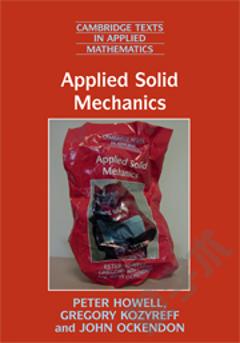Applied Solid Mechanics
The world around us, natural or man-made, is built and held together by solid materials. Understanding their behaviour is the task of solid mechanics, which is in turn applied to many areas, from earthquake mechanics to industry, construction to biomechanics. The variety of materials (metals, rocks, glasses, sand, flesh and bone) and their properties (porosity, viscosity, elasticity, plasticity) is reflected by the concepts and techniques needed to understand them: a rich mixture of mathematics, physics and experiment. These are all combined in this unique book, based on years of experience in research and teaching. Starting from the simplest situations, models of increasing sophistication are derived and applied. The emphasis is on problem-solving and building intuition, rather than a technical presentation of theory. The text is complemented by over 100 carefully-chosen exercises, making this an ideal companion for students taking advanced courses, or those undertaking research in this or related disciplines.
{{comment.content}}








 京公网安备 11010802027623号
京公网安备 11010802027623号